Posts tagged ‘liberal arts’
PCAS Expansion, Growth, Research, and SIGCSE 2024 Presentations
The ACM SIGCSE Technical Symposium is March 20-23 in Portland (see website here). I rarely blog these days, but the SIGCSE TS is a reminder to update y’all with what’s going on in the College of Literature, Science, & the Arts (LSA) Program in Computing for the Arts and Sciences (PCAS). PCAS is my main activity these days. Here’s the link to the PCAS website, which Tyrone Stewart and Kelly Campbell have done a great job creating and maintaining. (Check out our Instagram posts on the front page!)
PCAS Expansion
I’ve blogged about our first two courses, COMPFOR (COMPuting FOR) 111 “Computing’s Impact on Justice: From Text to the Web” and COMPFOR 121 “Computing for Creative Expression.” Now, we’re up to eight courses (see all the courses described here). As I mentioned at the start of PCAS, we think about computing in LSA in three themes: Computing for Discovery, Expression, and Justice. Several of these courses are collaborations with other departments, like our Discovery classes with Physics, Biophysics, Ecology and Evolutionary Biology, and Linguistics.
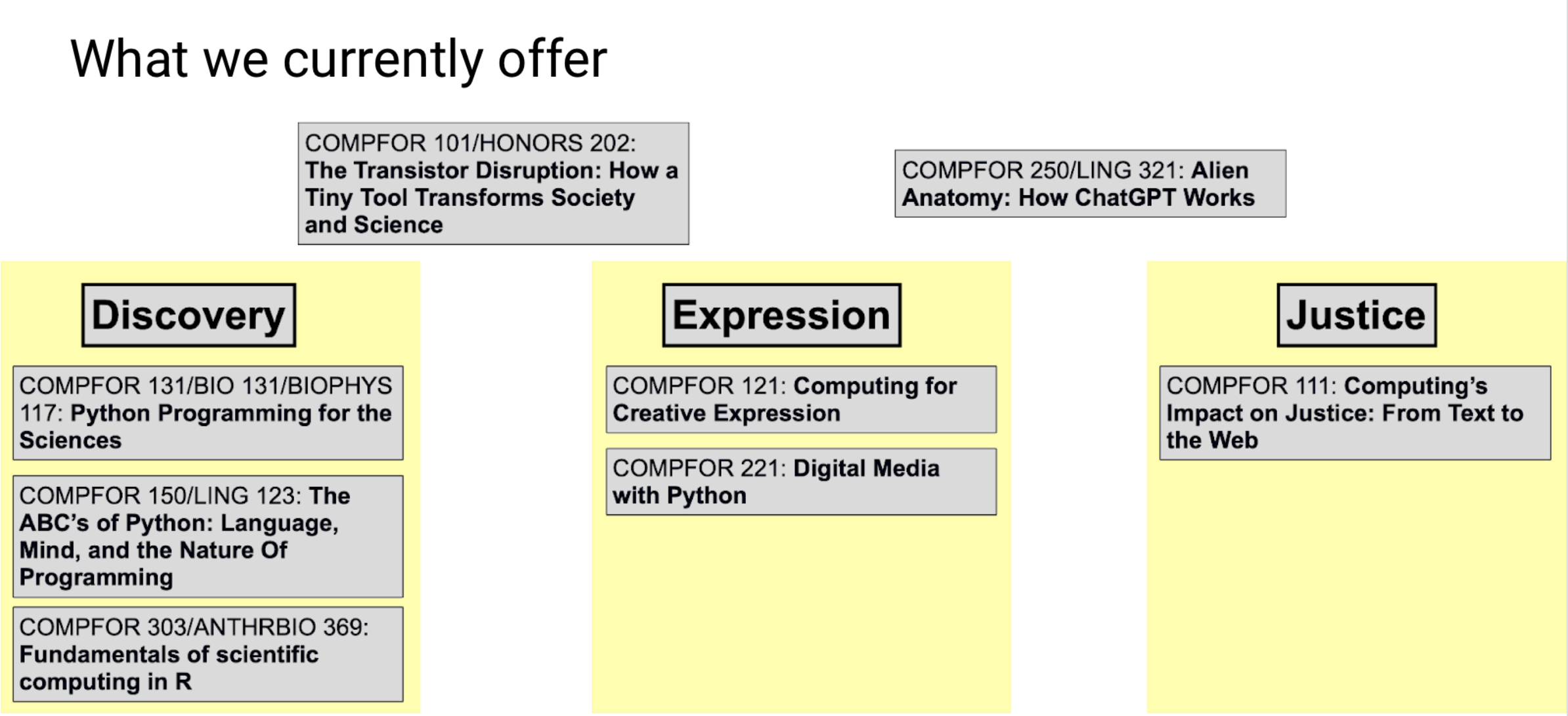
This semester, I’m teaching two brand new courses. That means that I’m creating them just ahead of the students. I did this in Fall 2022 for our first two courses (see links to the course pages here with a description of our participatory design process), and I hope to never do this again. It’s quite a sprint to always be generating material, all semester long, for about a hundred students.
One course is like the Media Computation course I developed at Georgia Tech, but in Python 3: COMPFOR 221: Digital Media with Python. The course title has changed. When we first offered it, we called it “Python Programming for Digital Media,” and at the end of registration, we had only five students enrolled! We sent out some surveys and found that we’d mis-named it. Students read “Python Programming” and skipped the rest. The class filled once we changed our messaging to emphasize Digital Media first.
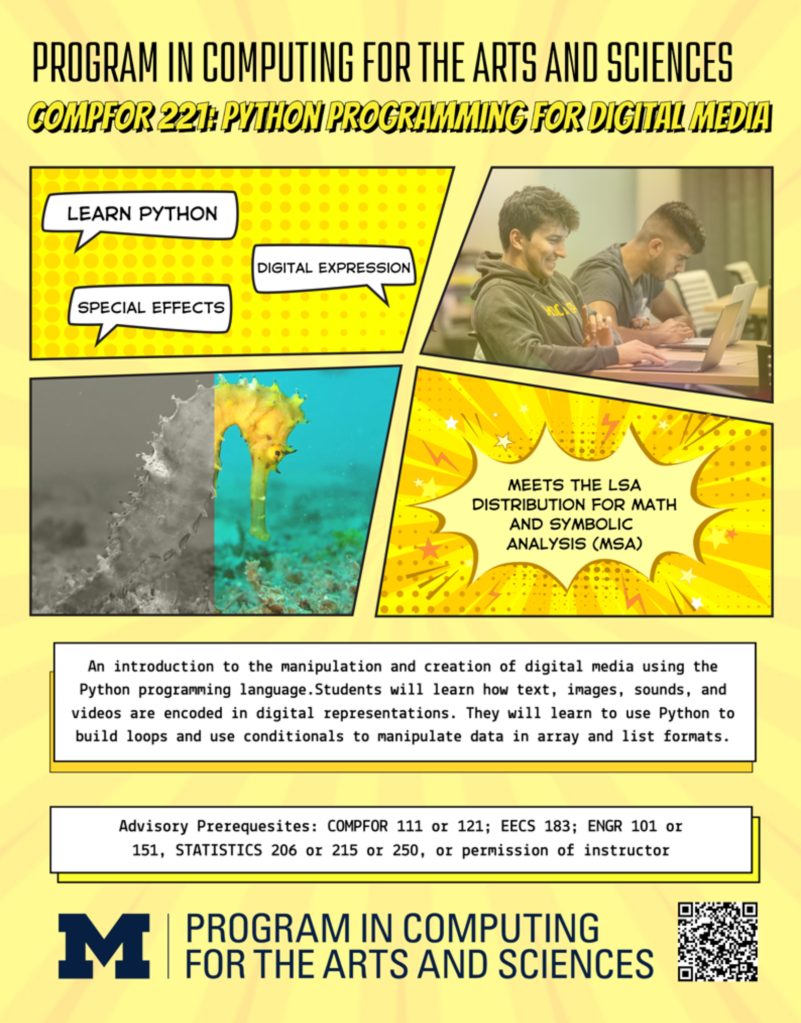
When we taught Media Computation at Georgia Tech, we used Jython and our purpose-built IDE, JES. Today, there’s jes4py that provides the JES media API in Python 3. I had no idea how hard it was to install libraries in Python 3 today! I’m grateful to Ben Shapiro at U-W who helped me figure out a bunch of fixes for different installation problems (see our multi-page installation guide).
The second is more ambitious. It’s a course on Generative AI, with a particular focus on how it differs from human intelligence. We call it Alien Anatomy: How ChatGPT Works. It’s a special-topics course this semester, but in the future, it’ll be a 200-level (second year undergraduate) course with no pre-requisites open to all LSA students, so we’re relying on teaspoon languages and Snap! with a little Python. I’m team-teaching with Steve Abney, a computational linguist. Steve actually understands LLMs, and I knew very little. He’s been a patient teacher and a great partner on this. I’ve had to learn a lot, and we’re relying heavily on the great Generative AI Snap! projects that Jens Mönig has been creating, SciSnap from Eckart Modrow, and Ken Kahn’s blocks that provide an API to TensorFlow.
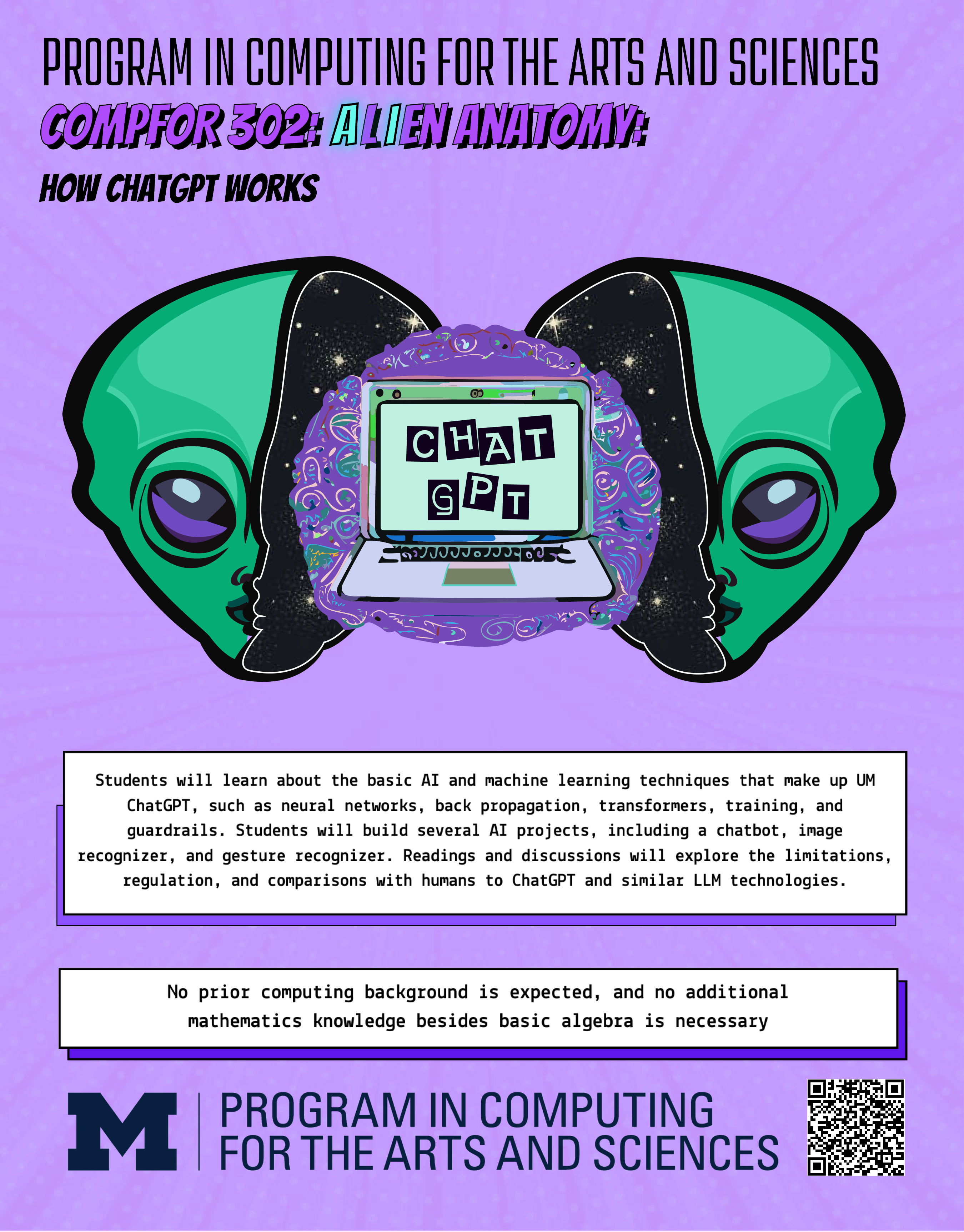
As of January, we are approved to offer two minors: Computing for Expression and Computing for Scientific Discovery. We have about a half dozen students enrolled so-far in the minors, which is pretty good for three months in.
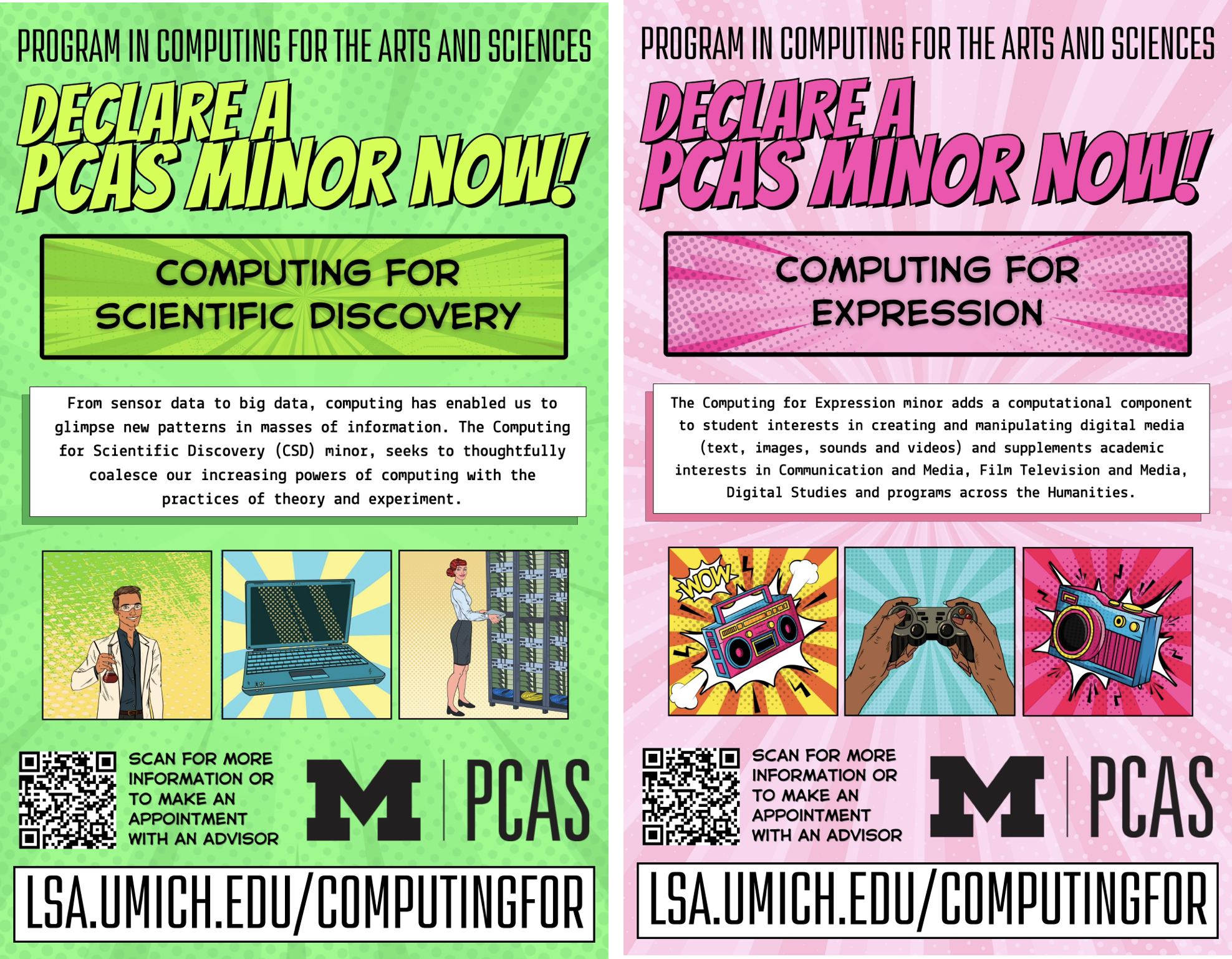
PCAS Growth
When I offered the first two courses in Fall 2022, we had 11 students in Expression and 14 in Justice. Now, we’re up to 308 students enrolled. That’s probably our biggest challenge — managing growth and figuring out how to sustain it.
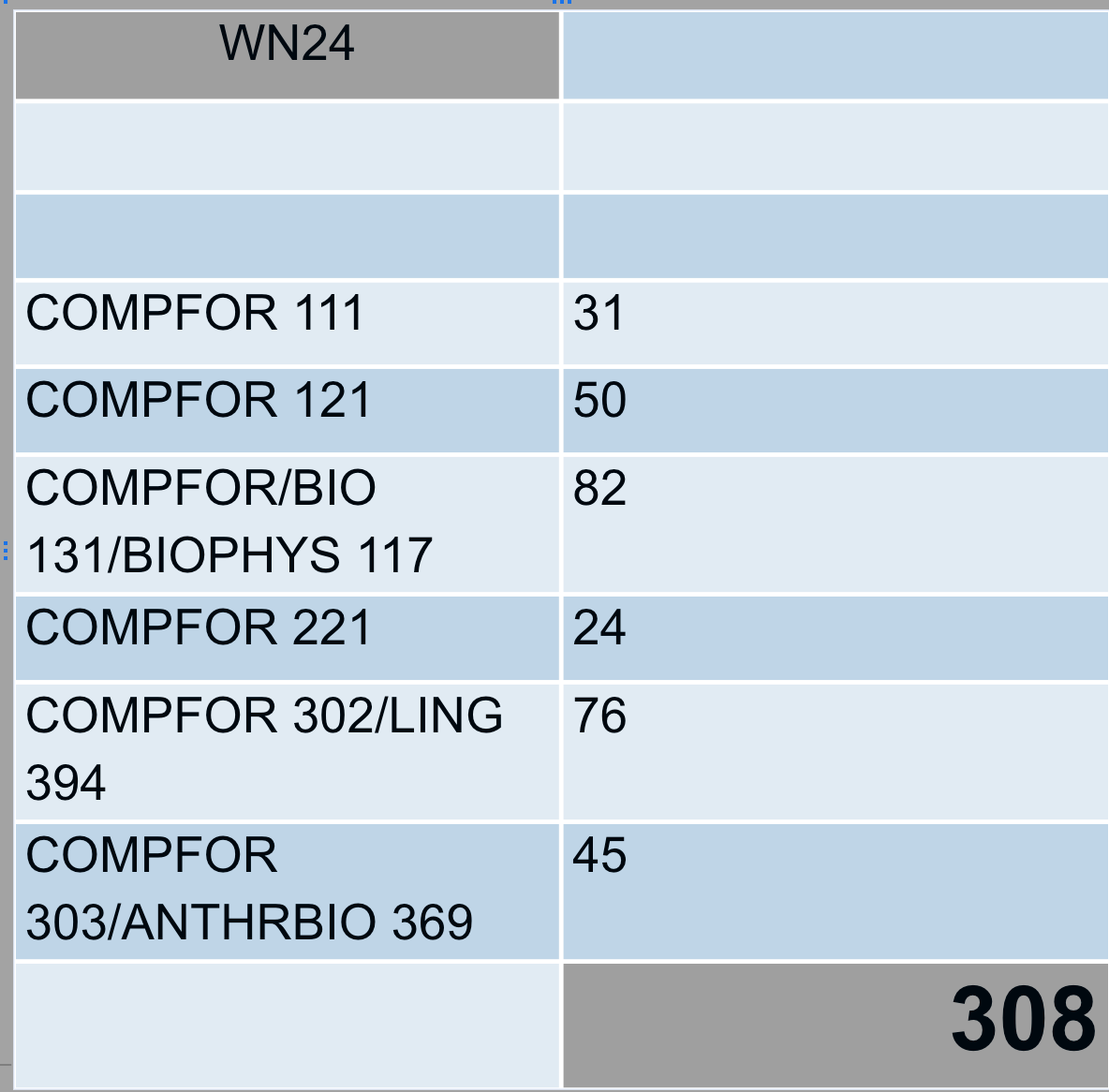
Research in PCAS
We’re starting to publish some of what we’re learning from PCAS. Last November, Gus Evrard and I published a paper at the Koli Calling International Conference on Computing Education Research about the process that we followed co-chairing the LSA Computing Education Task Force to figure out what LSA needed in computing education. That paper, Identifying the Computing Education Needs of Liberal Arts and Sciences Students, won a Best Discussion Paper Award. Here’s Gus and me at the conference banquet when we got our award.
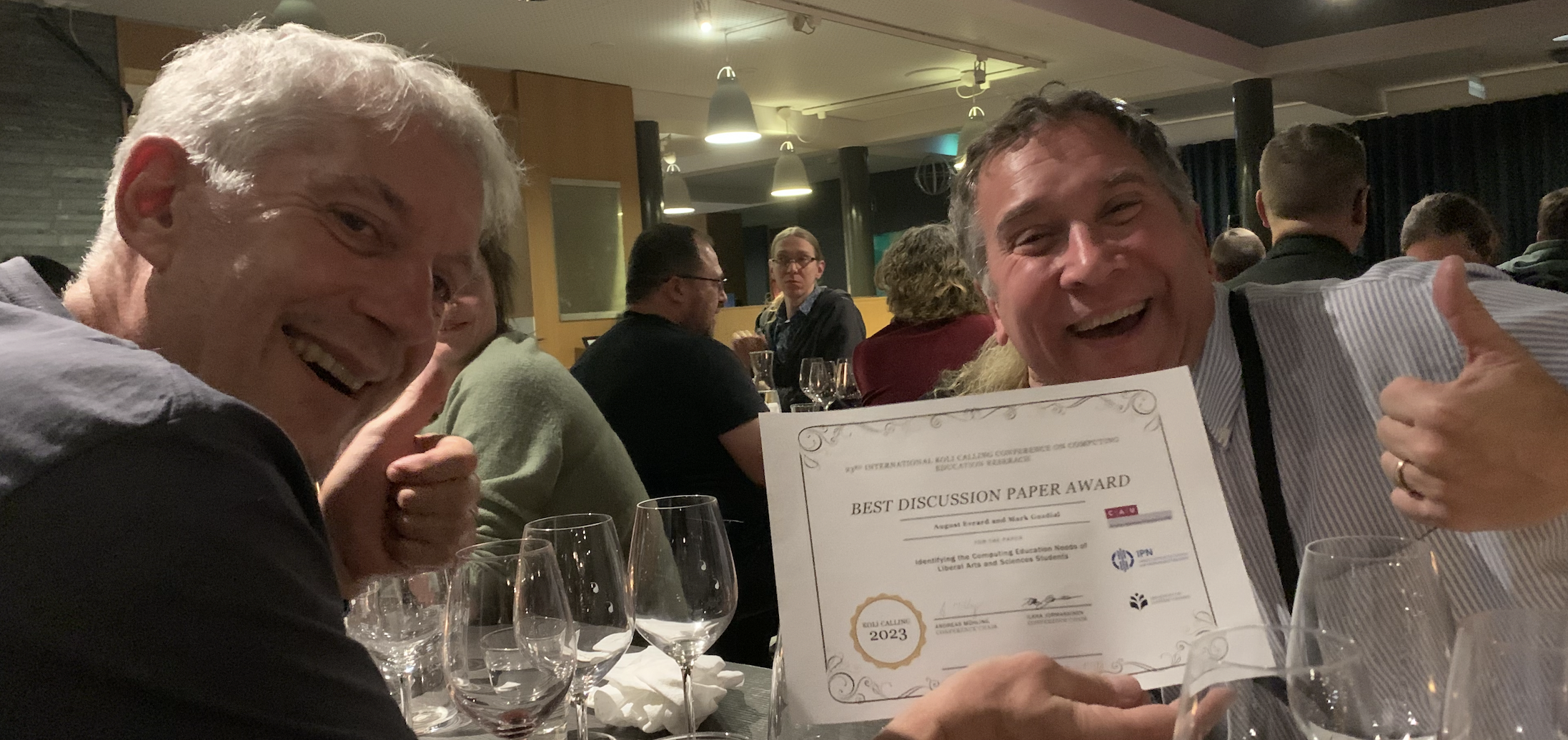
Tamara Nelson-Fromm just presented a paper at the 2024 PLATEAU Workshop on evidence we have suggesting transfer of learning from teaspoon languages into our custom Snap! blocks. I’ll wait until those papers are released to tell you more about that.
SIGCSE 2024 Presentations
We’re pretty busy at SIGCSE 2024, and almost all of our presentations are connected to PCAS.
Thursday morning, I’m on a panel led by Kate Lehman on “Re-Making CS Departments for Generation CS” 10:45 – 12:00 at Oregon Ballroom 203. This is going to be a hardball panel. Yes, we’ll talk about radical change, but be warned that Aman and I are on the far end of the spectrum. Aman is going to talk about burning down the current CS departments to start over. I’m going to talk about giving up on traditional CS departments ever addressing the needs of Generation CS (because they’re too busy doing something else) and that we need more new programs like PCAS. I’m looking forward to hear all the panelists — it’ll be a fun session.
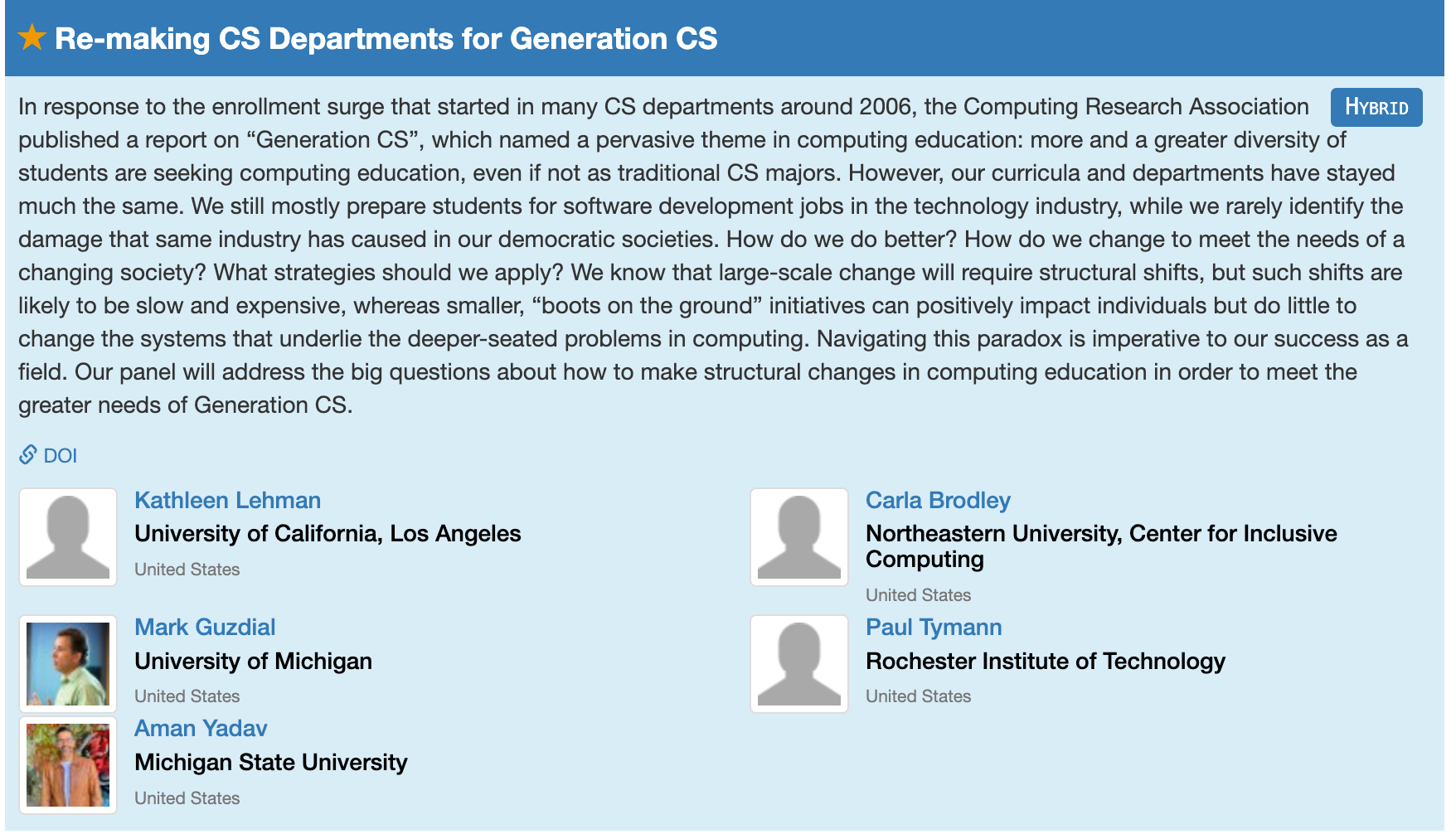
Thursday just after lunch, Neil Brown and I are presenting our paper, Confidence vs Insight: Big and Rich Data in Computing Education Research 13:45 – 14:10 at Meeting Room D135. It’s an unusual computing education research paper because we’re making an argument, not offering an empirical study. We’re both annoyed at SIGCSE reviewers who ask for contextual information (Who were these students? What programming assignments were they working on? What was their school like?) from big (millions of points) data, and then complaining about small sample sizes from rich data with interviews, personal connections, and contextual information. In the paper, we make an argument about what are reasonable questions to ask about each kind of data. In the presentation, the gloves come off, and we show actual reviews. (There are also costumes.)
We don’t really get into why SIGCSE reviewers evaluate papers with criteria that don’t match the data, but I have a hypothesis. SIGCSE reviewers are almost all CS teachers, and they read a paper asking, “Does this impact how I teach? Does it tell me what I need to do in my class? Does it convince me to change?” Those questions are too short-sighted. We need papers that answer those questions to help us with our current problems, but we also need to have knowledge for the next set of problems (like when we start teaching entirely new groups of students). The right question for evaluating a computing education research paper is, “Does this tell the computing education research community (not you the reviewer, personally, based on your experience) something we didn’t know that’s worth knowing, maybe in the future?”
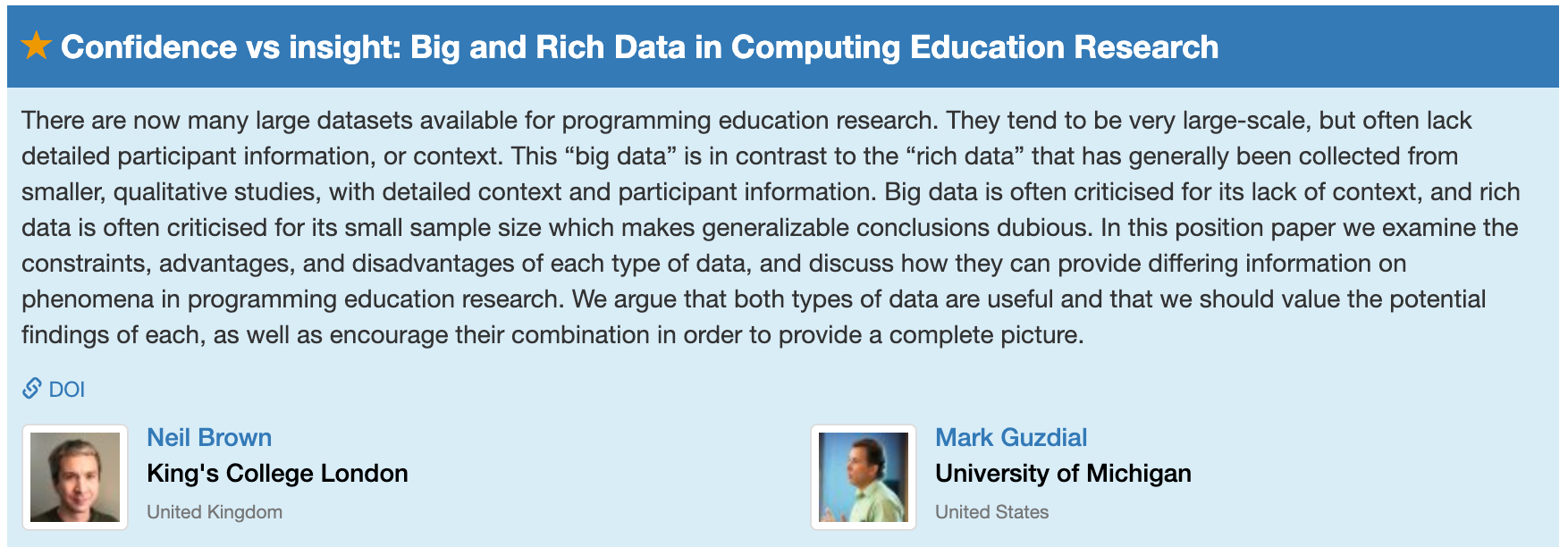
At the NSF Project Showcase Thursday 15:45 – 17:00 at Meeting Rooms E143-144, Tamara Nelson-Fromm is going to show where we are on our Discrete Mathematics project. She’ll demonstrate and share links to our ebooks for solving counting problems with Python and with one of our teaspoon languages, Counting Sheets.
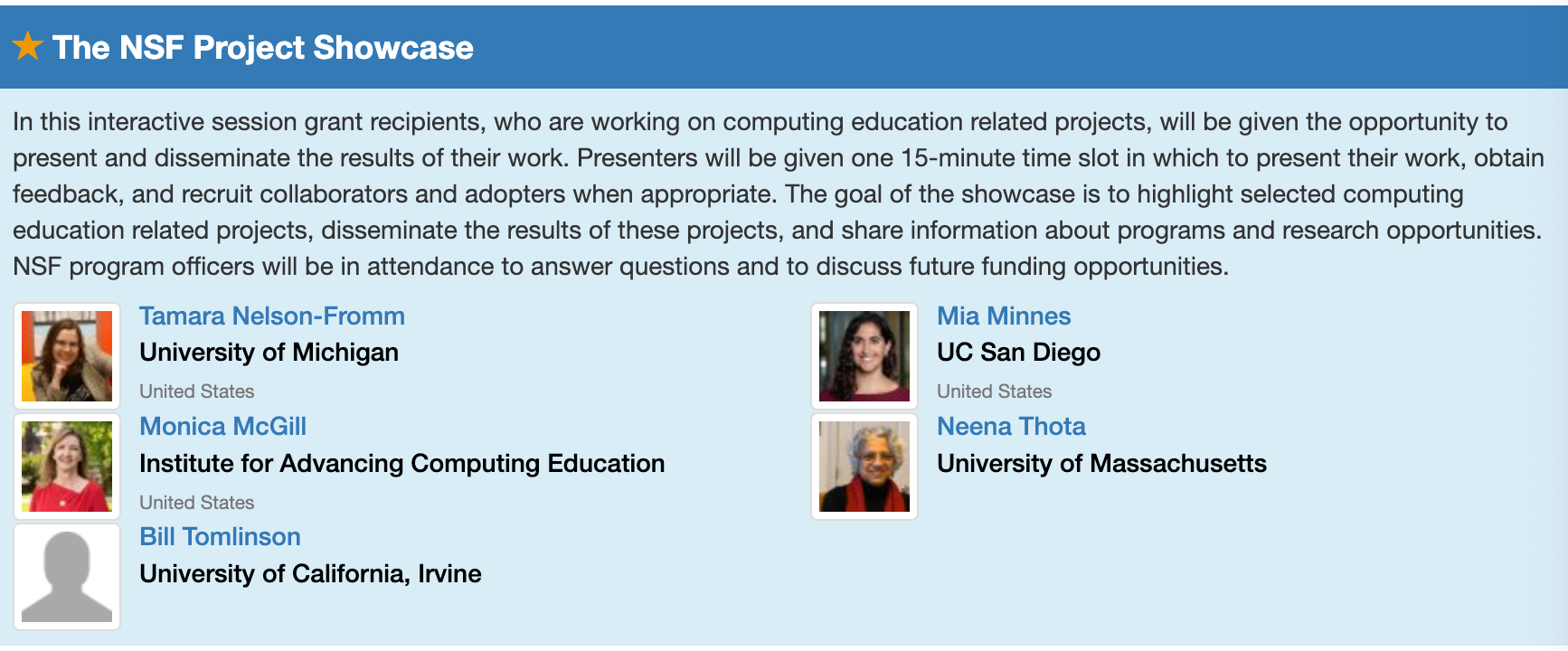
In the “second flock” of Birds of a Feather sessions Thursday 18:30 – 19:20 at Meeting Room D136, we’re going to be a part of Zach Dodd’s group on “Computing as a University Graduation Requirement”. There’s a real movement towards building out computing courses for everyone, not just CS majors, as we’re doing in PCAS. Zach is pushing further, for a general education requirement. I’m excited for the session to hear what everyone is doing.
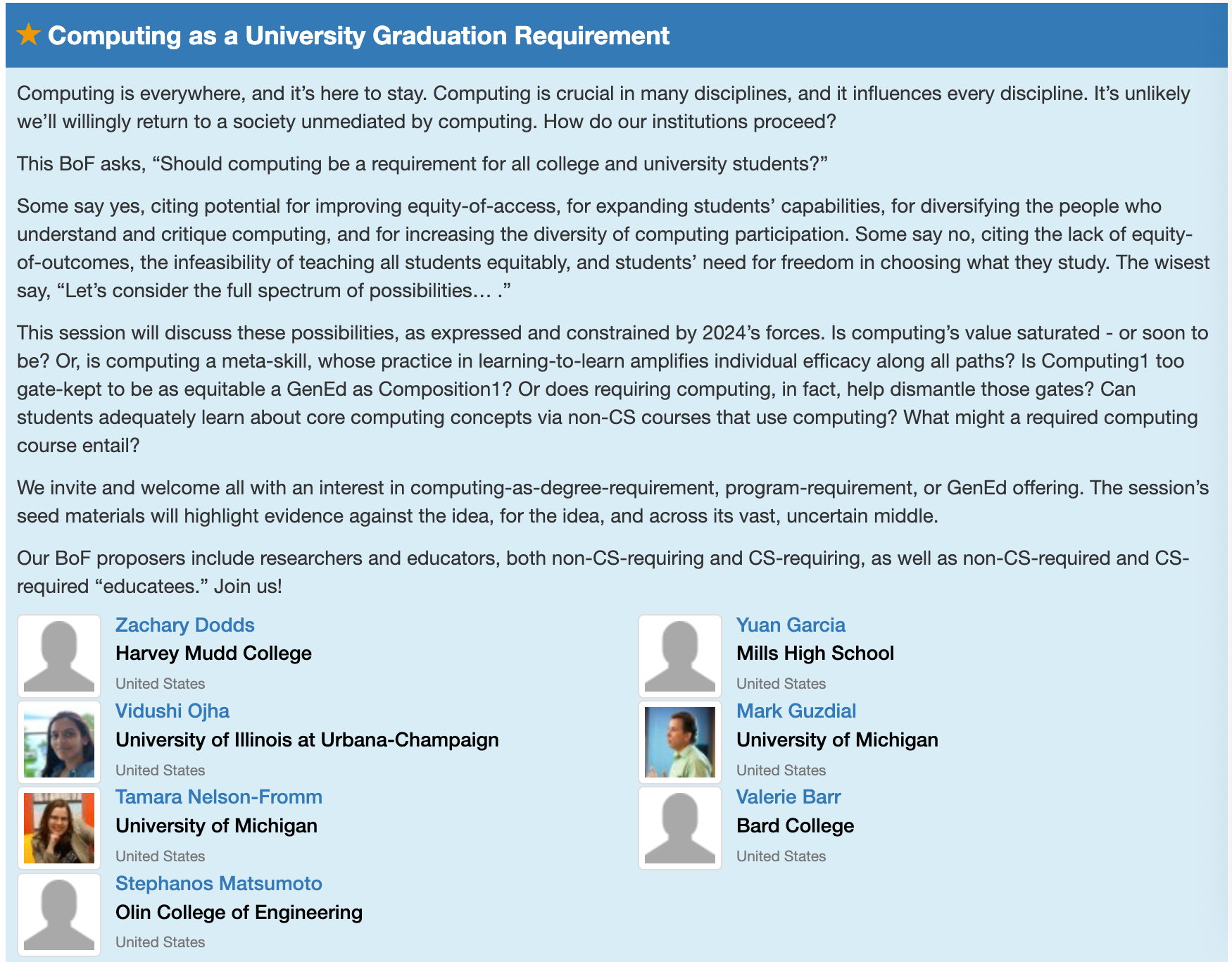
On Saturday afternoon 15:30 – 18:30 at Meeting Rooms B113, I’ll offer a three-hour workshop on how we teach in our PCAS courses for arts and humanities students, with teaspoon languages, custom Snap! blocks, and ebooks. Brian Miller has been teaching these courses this year, and he’s kindly letting me share the materials he’s been developing — he’s made some great improvements over what I did. This workshop was inspired by a comment from Joshua Paley in response to our initial posts about how we’re teaching, where he asked if I’d do a SIGCSE workshop on how we’re teaching PCAS. Will do it on Saturday!
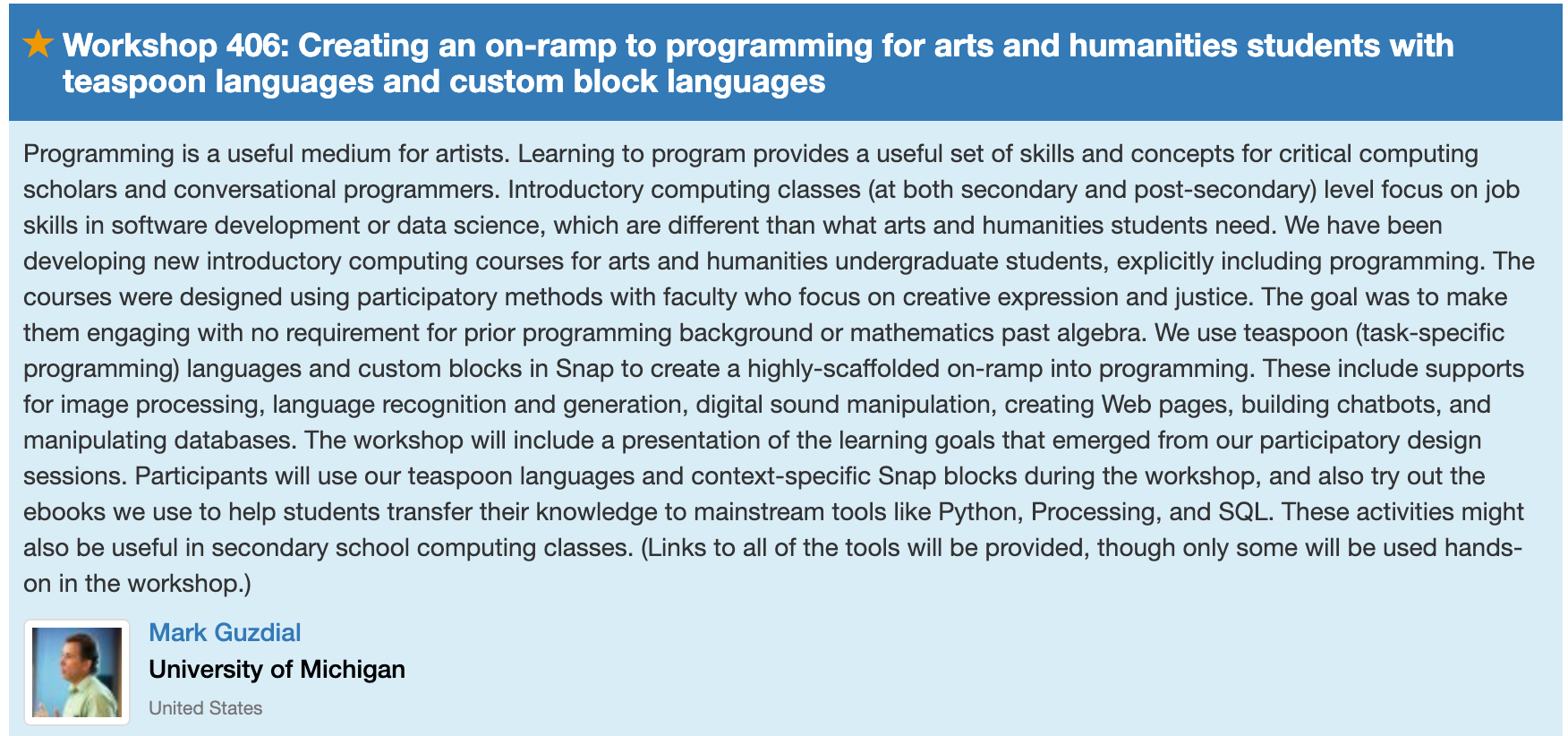
Updates: Developing the University of Michigan LSA Program in Computing for the Arts and Science
This blog is pretty old. I started it in June 2009 — almost 13 years ago. The pace of posting has varied from every day (today, I can’t understand how I ever did that!) to once every couple of months (most recently). There are things happening around here that are worth sharing and might be valuable to some readers, but I’m not finding much time to write. So, the posts the rest of this week will be quick updates with links for more information.
During most of the pandemic, I co-chaired (with Gus Evrard, a Physics professor and computational cosmologist) the Computing Education Task Force (website) for the University of Michigan’s College of Literature, Science, and the Arts (LSA). LSA is huge — about 20K students. (I blogged about this effort in April of last year.) Our job was to figure out what LSA was doing in computing education, and what else was needed. Back in November, I talked here about the three themes that we identified as computing education in LSA:
- Computing for Discovery: Think computational science, or data science + modeling and simulation.
- Computing for Expression: Think chatbots to Pixar to social media to Media Computation.
- Computing for Justice: Think critical computing and everything that C.P. Snow and Peter Naur warned us about computing back in the 1960’s.
Our report was released last month. You can see the release statement here, and the full report here. It’s a big report, covering dozens of interviews, a hundred survey responses, and a huge effort searching over syllabi and course descriptions to find where computing is in LSA. We made recommendations about creating a new program, new courses, new majors and minors, and coordinating computing education across LSA.
Now, we’re in the next phase — acting on the recommendations. LSA bought me out of my teaching for this semester, and it’s my full-time job to define a computing education program for LSA and to create the first courses in the program. We’re calling it the Program for Computing in the Arts and Science (PCAS). I’m designing courses for the Computing for Expression and Computing for Justice themes, in an active dialogue (drawing on the participatory design methods I learned from Betsy DiSalvo) with advisors from across LSA. (There are courses in LSA that can serve as introductions to the Computing for Discovery theme, and Gus is leading the effort to coordinate them.) The plan is to put up the program this summer, and I’ll start teaching the new courses in the Fall.
Why Arts and Social Science Needs Code: Testimonials
Interesting set of testimonials from people in arts and social science on why they have found it useful to learn to code (thanks to Alfred Thompson for the link). Gas Stations Without Pumps has an interesting post based on one of the testimonials.
Being able to code to express yourself is one of the most powerful tools available to artists today. Artists should look at programming languages as they do any other medium- watercolor, acrylic, clay- they are all tools to allow you to develop and communicate your vision with your audience.
via The Female Perspective of Computer Science: Why Arts and Social Science Needs Code: Testimonials.
School for Poetic Computation
I love the idea of this school. It reminds me of Donald Knuth’s Turing Award lecture Computing Programming as an Art and of Guy Steele’s call for an MFA in software practices.
We are interested in craft, and the idea that every writer needs space and time to hone their trade. Our school aims to provide a safe haven – so you could get acquainted with the craft at your own pace, make it your own, find that part between your true creative process and the craft. This takes time, encouragement, the right push at the right time, conversations with colleagues, and more time.
via SFPC – mission.
Where did CS PhD’s get their undergraduate degrees?
The latest issue of Computing Research News has a report from CRA-E (their Education subcommittee) on where CS PhD’s come from. Research universities, institutions that stop at Masters degrees, four year colleges, or top liberal arts institutions? Turns out the answer is that the vast majority of CS PhD’s get their undergraduate degrees from research universities, but the sum of the PhD’s who get their undergraduate degrees from the top 25 liberal arts institutions is greater than any single research institution. There’s also evidence that the research universities produce better graduate students, using NSF fellowships as the quality metric. That was quite unexpected — I would have guessed that the four years and the liberal arts institutions would have played a much greater role.
In 2010, 1665 Ph.D.’s were awarded in computer science of which 714 went to domestic students. Approximately 71% of the domestic Ph.D.’s received their undergraduate degrees from research universities, 15% from master’s institutions, 11% from four-year colleges, and 4% from other colleges. These proportions have remained essentially unchanged since 2000 with all four types seeing similar increases since 2005.
via Computing Research News – Online – Computing Research Association.
Essay calling for digital skills to be added to liberal arts disciplines
An interesting piece, which argues that proficiency with computing is an important part of a modern liberal arts education. The argument is a modern and updated version of the argument that Alan Perlis made back in 1961. The specific computing literacies being described go beyond computational thinking — it’s explicitly about being able to make with computing. Steve Jobs’ made a similar famous claim that computer science is a liberal art.
Students who graduate with a degree in liberal arts should understand the basic canon of our civilization as well as their place in the world, sure, but they also need to understand how to explore and communicate their ideas through visual communication, data manipulation, and even making a website or native mobile app. If they can’t, they’ll just understand the global context of their own unemployment.
via Essay calling for new skills to be added to liberal arts disciplines | Inside Higher Ed.
An explanation for U. Florida’s CISE actions: A move towards Liberal Arts
Maybe this is just rationalization, but it’s particularly interesting from a “computer science as a liberal art” perspective. The Dean of Engineering at U. Florida is described below as saying that these changes would encourage more liberal arts students to study computer science which is what local employers want. Most of the explanations I’ve read for the change were more about strengthening computer engineering and tying CS and EE together more strongly.
Abernathy said she expects the changes actually would boost the computer science program’s enrollment. She said she has talked with MindTree about its employment needs and said the changes would help achieve its goal of hiring liberal arts students also studying computer science.
via Engineering College chairman blasts cuts as wrong time, wrong place | Gainesville.com.
Why go to college? Liberal Arts vs. Computing
My son is going to Georgia Tech in the Fall, in the Computational Media degree program. Because the CM program is joint between GT’s Colleges of Liberal Arts and Computing, we went to both College’s presentations during Freshman Orientation last week. I found the contrast between the two of them fascinating.
The Ivan Allen College of Liberal Arts starts their orientation with a brief documentary about Ivan Allen, the former mayor of Atlanta for whom the College is named. John Tone, Associate Dean of the College, explains that the College shares Allen’s values and encourages students to model themselves on Allen. The presentation goes on with the theme, “Find Your On Switch.” Explicitly, the point is made that the goal of a liberal arts education at Georgia Tech is for each student to figure out what they are most passionate about, what they want to sink time into in order to develop expertise. International experiences, like study abroad and internships, were explained in terms of the opportunities they provided for seeing more options, other ways to find your “On Switch.” (About 40% of Georgia Tech’s undergraduates have some international experience, with a goal of getting that to 50%.) Overall, this presentation was highly successful with the students, and the parents were excited, too. I saw a mother in front of me write a note to her daughter saying, “This Is So Cool!!”
The College of Computing talked about jobs. Parents were told about the bright prospects for a computing career. The curriculum was explained in terms of how it prepared students for the workforce. International experience (exactly the same programs!) was introduced as a way to prepare students for a globally competitive marketplace, and about how the top companies valued students with an international perspective. Many of the parents seemed engaged by this perspective, and asked pointed questions, such as whether the robotics approach in CS1 was really the right one to prepare students for more general computing tasks and whether the Computational Media degree really prepared students for the jobs that were available today.
I found the contrast fascinating, especially when the two College’s were talking about the exact same thing. I don’t think that either presentation is wrong or even contradictory, though each can be critiqued as being too narrow. The Computing perspective lends itself to seeing GT as a vocational school, and anything not related to tomorrow’s job ad is clearly irrelevant. The Liberal Arts perspective can be read as encouraging students to ignore everything that he or she finds boring or hard — if it doesn’t “Find Your On Switch,” then it’s clearly not important, is it?
As a Computing faculty member, I personally found the Liberal Arts presentation novel and refreshing. I frequently have to defend what I teach to my students on the grounds that, “Yeah, real companies really do this.” (For example, we brought in real developers last year to our Senior Design class, to convince them that Scrum was worth learning.) I love the idea of being able to argue, instead, “Try it, because it’s fascinating and will allow you to think about problem solutions in an entirely new way, maybe in a way that you will find intriguing and engaging!” Hmm, I wonder if that argument actually flies with Liberal Arts majors. I am pretty sure that it wouldn’t with CS majors.
Recent Comments